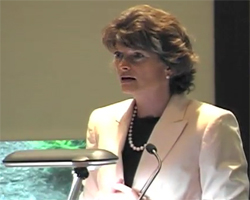ARCUS Federal Advocacy | Senator Murkowski

26 May 2006
The concluding keynote at the 2006 Arctic Forum was delivered by Senator Lisa Murkowski (R-AK).A transcript and video have been made available below.
Advancing Arctic Research
Through Policy and Science Advocacy
![]() PDF
- Transcript (15
K)
PDF
- Transcript (15
K)
![]() Quicktime Movie (82 MB)
Quicktime Movie (82 MB)
Page 1 | Page 2
Thank you for inviting me to be with you today.
It is a pleasure to join ARCUS members for the 2006
Arctic Forum. And I appreciate that you are
still here late on a Friday afternoon after two days
of speeches and workshops.
I would like to start by saying how much we in Congress appreciate and count on the work you are doing when it comes to Arctic research. The Arctic is still a new frontier for many in Congress. From climate change and development of our natural resources, to international treaties and maritime rights, more knowledge about each of these issues is needed to help us formulate and shape the policies that will impact the Arctic for future generations.
While differences of opinion on the aforementioned issues remain, one area that I believe we cannot lose focus on is the human dimension. Our policies of today, and our policies of tomorrow, have a direct impact on those who live in the Arctic region.
The fast approaching International Polar Year offers a tremendous opportunity to move the United States forward with its Arctic policies. It has been nearly 50 years since the last International Polar Year – 14 years since the U.S. last developed an Arctic policy.
The world was a different place fourteen years ago. The Cold War had just ended. Climate change was barely being considered as an issue. An accessible, navigable Arctic Ocean was nowhere near as real a prospect as it is today. The Arctic Council was just getting started. And we had nowhere near the sensitivity to the changes life is bringing to indigenous residents.
When I visit the Native villages in northern Alaska, I ask the village elders what climate change means to them. They don’t speak about the Pacific Decadal Oscillation, or attempt to debunk the now infamous hockey stick theory.
They tell me what they have personally observed over the years. Native whaling captains tell me that the ice pack is less stable, and that there is more open water requiring them to travel greater distances to hunt. The snow pack is coming later and melting earlier than in years past. Salmon are showing up in subsistence nets in greater numbers across the arctic. Different types of vegetation now grow where they never grew before. The migratory patterns of animals have changed. Warmer, drier air, has allowed the voracious spruce bark beetle to migrate north, moving through our forests in the south-central part of the state. At last count, over three million acres of forest land has been devastated by the beetle, providing dry fuel for outbreaks of enormous wild fires. To give you some perspective, that is almost the size of Connecticut.
Times have changed and we need a new Arctic
policy. But how do we craft it?
I believe the upcoming International Polar Year can
play a large role in focusing our nation, and for
that matter the world, on the work that is being
done, and needs to be done, in the Arctic. It
can play a large role in crafting a new Arctic
policy.
But what those of us who care the most about the Arctic must do – and I put this forward as a challenge to you – is find a way to generate the public’s interest in this area. What is the theme of IPY? What is the catch phrase used to describe it? After all, ask anyone on the street what International Polar Year is, and you get a blank look in return.
According to the National Academy of Science, the purpose of International Polar Year is to “further our understanding of physical and social processes in the polar regions, examine their globally connected role in the climate system, establish research infrastructure for the future, and serve as a mechanism to attract and develop a new generation of scientists and engineers with the versatility to tackle complex global issues.”
For me, as a member of Congress, it is important that I can easily explain to my colleagues what IPY is without going into a deep explanation about what an Arctic Observing Network is, or what lives in the cold and dark – two of the currently proposed themes set for IPY.
The theme should spark an interest in those whose expertise may not be in the Polar Regions. Most importantly, the theme should be international. The Polar Regions bring every country together, whether in the area of climate change or in the issue of commerce, especially if shipping routes in the Arctic are opened.
The worst case scenario for IPY is for great scientific achievements to happen over the next two years, and nobody knows about it. Showcasing IPY is essential. {more on Page 2}